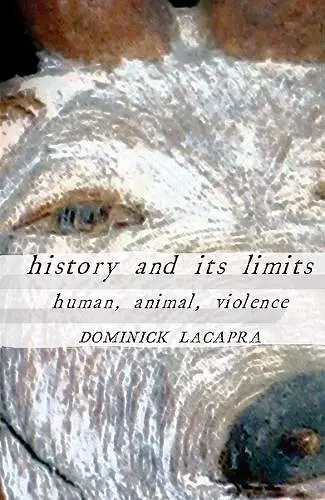History and Its Limits
Human, Animal, Violence
Format:Paperback
Publisher:Cornell University Press
Published:2nd Apr '09
Currently unavailable, and unfortunately no date known when it will be back

Dominick LaCapra's History and Its Limits articulates the relations among intellectual history, cultural history, and critical theory, examining the recent rise of "Practice Theory" and probing the limitations of prevalent forms of humanism. LaCapra focuses on the problem of understanding extreme cases, specifically events and experiences involving violence and victimization. He asks how historians treat and are simultaneously implicated in the traumatic processes they attempt to represent. In addressing these questions, he also investigates violence's impact on various types of writing and establishes a distinctive role for critical theory in the face of an insufficiently discriminating aesthetic of the sublime (often unreflectively amalgamated with the uncanny).
In History and Its Limits, LaCapra inquires into the related phenomenon of a turn to the "postsecular," even the messianic or the miraculous, in recent theoretical discussions of extreme events by such prominent figures as Giorgio Agamben, Eric L. Santner, and Slavoj Zizek. In a related vein, he discusses Martin Heidegger's evocative, if not enchanting, understanding of "The Origin of the Work of Art." LaCapra subjects to critical scrutiny the sometimes internally divided way in which violence has been valorized in sacrificial, regenerative, or redemptive terms by a series of important modern intellectuals on both the far right and the far left, including Georges Sorel, the early Walter Benjamin, Georges Bataille, Frantz Fanon, and Ernst Jünger.
Violence and victimization are prominent in the relation between the human and the animal. LaCapra questions prevalent anthropocentrism (evident even in theorists of the "posthuman") and the long-standing quest for a decisive criterion separating or dividing the human from the animal. LaCapra regards this attempt to fix the difference as misguided and potentially dangerous because it renders insufficiently problematic the manner in which humans treat other animals and interact with the environment. In raising the issue of desirable transformations in modernity, History and Its Limits examines the legitimacy of normative limits necessary for life in common and explores the disconcerting role of transgressive initiatives beyond limits (including limits blocking the recognition that humans are themselves animals).
In his most recent collection of essays, the eminent intellectual historian Dominick LaCapra reconfirms his place as one of the most incisive and theoretically sophisticated scholars in the humanities today. All of the essays in one way or another address a general problem that has preoccupied LaCapra for many years, namely, how can the discipline of history open itself with greater effect toward a more expansive and theoretically informed awareness of its own methods, its present limits, and its future possibilities? In our ongoing and collective explorations of what the call to intensified criticism might mean, the historical profession has no better guide than LaCapra.
-- Peter E. Gordon * Journal of Modern HistoISBN: 9780801475153
Dimensions: unknown
Weight: 454g
248 pages